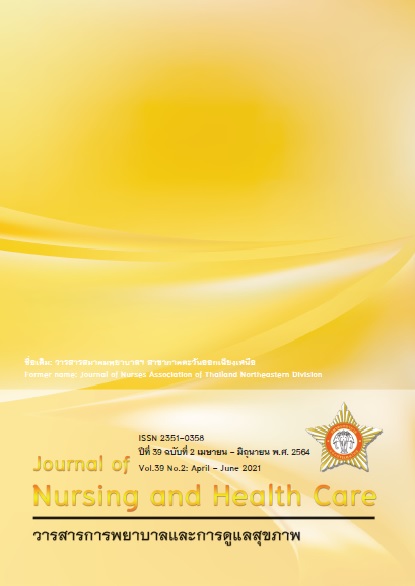ปัจจัยที่มีอิทธิพลต่อพฤติกรรมการดูแลตนเองของผู้ป่วยโรคหลอดเลือดหัวใจ ที่มารับบริการโรงพยาบาลแก้งคร้อ จังหวัดชัยภูมิ
คำสำคัญ:
ปัจจัยทำนาย, พฤติกรรมการดูแลตนเอง, โรคหลอดเลือดหัวใจบทคัดย่อ
การวิจัยแบบบรรยายเพื่อศึกษาความสัมพันธ์และปัจจัยที่มีอิทธิพลต่อพฤติกรรมการดูแลตนเองของผู้ป่วยโรคหลอดเลือดหัวใจที่มารับบริการโรงพยาบาลแก้งคร้อ จังหวัดชัยภูมิ กลุ่มตัวอย่างคือผู้ป่วยโรคหลอดเลือดหัวใจ คัดเลือกกลุ่มตัวอย่างโดยวิธีการสุ่มอย่างง่ายจำนวน 82 คน เครื่องมือที่ใช้ประกอบด้วยแบบสอบถามข้อมูลส่วนบุคคลแบบสอบถามการสนับสนุนทางสังคม และแบบสอบถามพฤติกรรมการดูแลตนเองของผู้ป่วยโรคหลอดเลือดหัวใจ เก็บรวบรวมข้อมูลระหว่างเดือนกันยายน – พฤจิกายน พ.ศ.2563 วิเคราะห์ข้อมูลโดยใช้สถิติเชิงพรรณนา ค่าสัมประสิทธิ์สหสัมพันธ์ของเพียร์สัน และสถิติถดถอยพหุคูณแบบขั้นตอน
ผลการวิจัยพบว่า 1) ปัจจัยส่วนบุคคล ได้แก่ อายุ รายได้ต่อเดือน และดัชนีมวลกาย มีความสัมพันธ์ทางบวกกับพฤติกรรมการดูแลตนเองของผู้ป่วยโรคหลอดเลือดหัวใจอย่างมีนัยสำคัญทางสถิติ (p< 0.05) ส่วนการสนับสนุนทางสังคม พบว่าการสนับสนุนทางสังคมมีความสัมพันธ์ทางบวกกับพฤติกรรมการดูแลตนเองของผู้ป่วยโรคหลอดเลือดหัวใจอย่างมีนัยสำคัญทางสถิติ (p< 0.05) การสนับสนุนด้านการปฏิบัติตัว ด้านข้อมูลข่าวสารและด้านเครื่องมือและสิ่งแวดล้อมมีความสัมพันธ์ทางบวกกับพฤติกรรมการดูแลตนเองของผู้ป่วยโรคหลอดเลือดหัวใจอย่างมีนัยสำคัญทางสถิติ (p< 0.01) 2) ปัจจัยที่มีอิทธิพลต่อพฤติกรรมการดูแลตนเองของผู้ป่วยโรคหลอดเลือดหัวใจได้แก่ รายได้ต่อเดือน (Beta = 0.822, p< 0.01) การสนับสนุนด้านเครื่องมือและสิ่งแวดล้อม (Beta = 0.246, p< 0.01) และดัชนีมวลกาย (Beta = - 0.209, p< 0.05) สรุปได้ว่า ปัจจัยทั้งหมดสามารถร่วมทำนายพฤติกรรมการดูแลตนเองของผู้ป่วยโรคหลอดเลือดหัวใจได้ร้อยละ 73.00
Downloads
เอกสารอ้างอิง
WHO,2015.
2. Prachuablarp C, Predicting factors of preventive behaviors of coronary heart disease and stroke among
menopausal women. Thai Journal of Cardio-Thoracic Nursing. 2020; 31(1): 27-45. (in Thai)
3. Bureau of Policy and Strategy, Ministry of Public Health Public Health Statistics A.D., 2019. (in Thai)
4. Sirichaya P and Nunthaitaweekul P. Predicting Factors of Dietary Behaviors in Patients with Coronary Artery
Disease. Royal Thai Navy Medical Journal. 2021; 45(3): 527-543. (in Thai)
5. Chinphan S, Onsiri S and Wattanaburanon A. Factors Correlated with Instent Restenosis in Coronary Heart
Disease Patients. Journal of The Royal Thai Army Nurses. 23(2): 218-226. (in Thai)
6. Tongtiam W, Jitpanya C and Tantikosoom P, Symptom Distress, Fear of Fall and Physical Activity in Patients
Post Coronary Artery Bypass Graft. Princess Narathiwat University. 2016; 8(1): 27-38. (in Thai)
7. Saengsiri M, Wattradul D, Kangchanakul S, NatthumrongkulS, Nopplub S, Wonganunnont S. The factors
influencing the self-care agency and quality of life of patients with coronary artery disease. Thai
Journal of Cardio-Thoracic Nursing. 2015; 26(1): 104-118. (in Thai)
8. Prompiw S, Tumnong C, Wongkpratoom S, Wongvipaporn C. The Effects of a Perceived Self-Efficacy
Program on the Exercise and Diet Behaviors of Patients with Acute Coronary Syndrome Post
Percutaneous Coronary Intervention. Journal of Nursing and Health Care. 2015; 33(1): 23-33. (in Thai)
9. Wichitthongchai C. The Factors Associated with Food Consumption Behaviors of Cardiac and Arterial
Diseases Patients, Queen Sirikit Heart Center of the Northeastern Region, Khon Kaen University.
Srinagarind Med Journal . 2012; 27(4): 340-346. (in Thai)
10. Orem DE. Nursing: concepts of practices. 6th ed. St. Louis: Mosby Year Book; 2001.
11. Lasutham K, Siripitayakunkit A, Panpakdee O. Factors Related to Self-Care Behavior of Thai Buddhist
Monks with Coronary Artery Disease. Rama Nurs Journal. 2019; 24(3): 313-327. (in Thai)
12. Cohen J. Statistical power analysis for the behavioral sciences. New Jerseys: lawence Earlbaum
Associates; 1998.
13. Beast, 1997: 174; Daniel, 1995: 19 inside Sumathana Klangkarn and Vorrapoj Promsatayapro , 2010.
14. Jansrithong P. and Choowattanapakorn T. Factors Predicting Self Management in Older Persons with
Acute Coronary Syndrom in Terialry Hospitals, Bangkok. Journal of Nursing Science Chulalongkorn
University. 2018; 30(2): 81-95. (in Thai)
15. Sutthipatthanang C, Ratsiri K. Thato Factors predicting preventive behaviors for coronary artery disease
among autonomous university staff in Bangkok. Thai Journal of Cardio-Thoracic Nursing. 2017; 28(2):
111-125. (in Thai)
16. Pattanajak C, Ruaisungnoen W. Effect of preparatory information on anxiety and procedural adherence
among patients undergoing coronary angiogram. Journal of Nursing Science & Health. Journal of
Nursing Science & Health. 2018; 41(3): 10-19. (in Thai)



